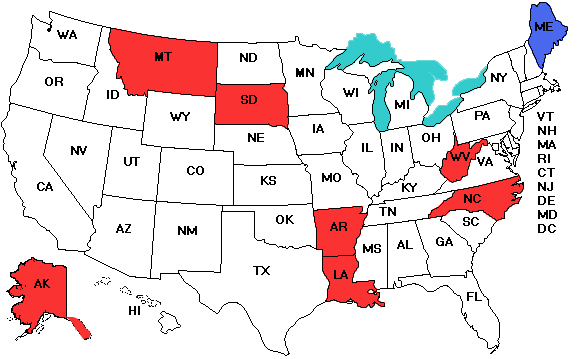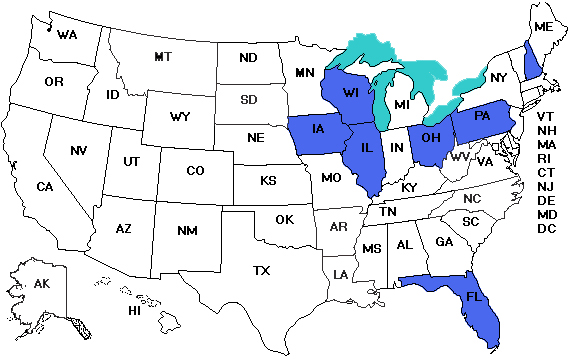It is an open question which political party will control the Senate after this year's midterm elections. But no matter the outcome -- whether Republicans gain control or Democrats narrowly retain it -- it is worth taking a look at the underlying dynamics of the Senate field for the next two election cycles. Because while 2014 is a year where Republicans have a big advantage, 2016 is going to give Democrats a decided edge.
The best explanation I've yet found of these underlying advantages was a recent blog posting on Electoral-Vote.com, which pointed out how tilted the playing field will be in both 2014 and 2016. The maps below both come from this site, I should also mention (and, while doing so, thank Electoral-Vote for their generous usage policy which allows me to post them here).
Senators serve six-year terms. And only one-third of them are up for re-election in each cycle. What this means is that what happened six years prior to any given Senate election shows which states each party will be either defending or fighting for. In 2014, the election that matters most was 2008 -- a landslide year for Democrats. Because of this landslide, Democrats hold several Senate seats in states that would otherwise be considered Republican red. Using the state's vote in the last presidential election as a guide, here are the eight states which have "mismatched" senators (senators from the opposite party than the state's presidential vote) in this year's election:

This clearly shows the 7-to-1 tilt of the playing field. Maine is the only blue state represented by a Republican senator, while Democrats hold Senate seats in Alaska, Arkansas, Louisiana, Montana, North Carolina, South Dakota, and West Virginia -- red states all (although North Carolina, at least, should be considered somewhat purple).
Now, this is only a theoretical look, and doesn't take into account the actual candidates or races. If the map were accurately predictive, Republicans would pick up a net total of six seats -- exactly what they need to flip the chamber's control. As we get closer to the general election, it'll be easier to see what the chances are for each state, of course. Right now, you'd have to start by pointing out that Maine is a pretty safe bet for Republicans, which means they might actually be up seven seats. Montana, South Dakota, and West Virginia are probably going Republican this year, although the other states on this map will likely be more competitive for Democrats (especially Arkansas and North Carolina). Democrats are also hoping for upset victories in Kentucky and Georgia, which could also alter the final math.
The map reflects none of this, of course, because it is a look at the underlying dynamics -- the headwinds each party faces, to put it another way. But the entire situation is reversed in 2016, since the field will be made up of senators elected in 2010 -- a landslide Republican year. What this means is that there will be seven races with mismatched senators, and they're all Republicans:

Republicans will be playing defense in Florida, New Hampshire, Illinois, Iowa, Ohio, Pennsylvania, and Wisconsin. Of particular note, Iowa's Chuck Grassley may retire (he will be 83), and Marco Rubio may run for president and give up his Senate seat to do so.
Of course, if it is too early to accurately be predicting Senate races for 2014, it is way too early to attempt to do so for the 2016 race. But no matter what happens, these two maps show that while Republicans have a big advantage in the 2014 contests, that advantage will be completely flipped towards Democrats in 2016. Neither map is likely to be 100 percent predictive, but they do show the headwinds both parties will face in the next two cycles.
The Electoral-Vote.com article (which is well worth reading in full) also takes a look at the 2018 race, and ends with a very interesting conclusion:
The long-range prospects of the parties can have short-term consequences, though. Suppose the Republicans get 51 seats in the new Senate. The House will immediately pass a bill to repeal the [Affordable Care Act] and send it over to the Senate. Sen. Ted Cruz (R-TX) will loudly demand a straight up-or-down vote on it, which will put Mitch McConnell in a bind (we can safely assume McConnell will be majority leader in this scenario because if he loses his own race in 2014, it is very unlikely the Republicans will have a majority). If McConnell tries to bring a repeal bill to the floor, the minority Democrats will filibuster it. McConnell could abolish the filibuster once and for all, but he is smart enough to know that after the 2016 elections, the Republicans will probably be back in the minority. So his choices will be either (1) tell Cruz to shut up, let the Democrats filibuster, and take the heat, or (2) abolish the filibuster and give up the power to obstruct after returning to the minority starting in January 2017.
If the Senate does flip control, President Obama is going to have a rocky end to his presidency, whether McConnell gets rid of legislative filibusters or not. Obama will spend two years vetoing bills, or Senate Democrats will spend two years filibustering everything in sight. Nothing much will get accomplished, either way. The budget fights will be epic, one assumes, making the fiscal cliff look like a picnic in the park in retrospective.
If Democrats hold the White House in 2016, though, the new president will have a good chance of having a comfortable majority back in the Senate to work with. Because no matter what happens in 2014, the underlying dynamics of which senators are up for election in which states clearly favors the Democrats next time around. That may not be enough to comfort Democrats who are now very worried about the control of the Senate for the next two years, but at least it shows a brighter playing field when we elect our next president.
-- Chris Weigant
Cross-posted at The Huffington Post
Follow Chris on Twitter: @ChrisWeigant







